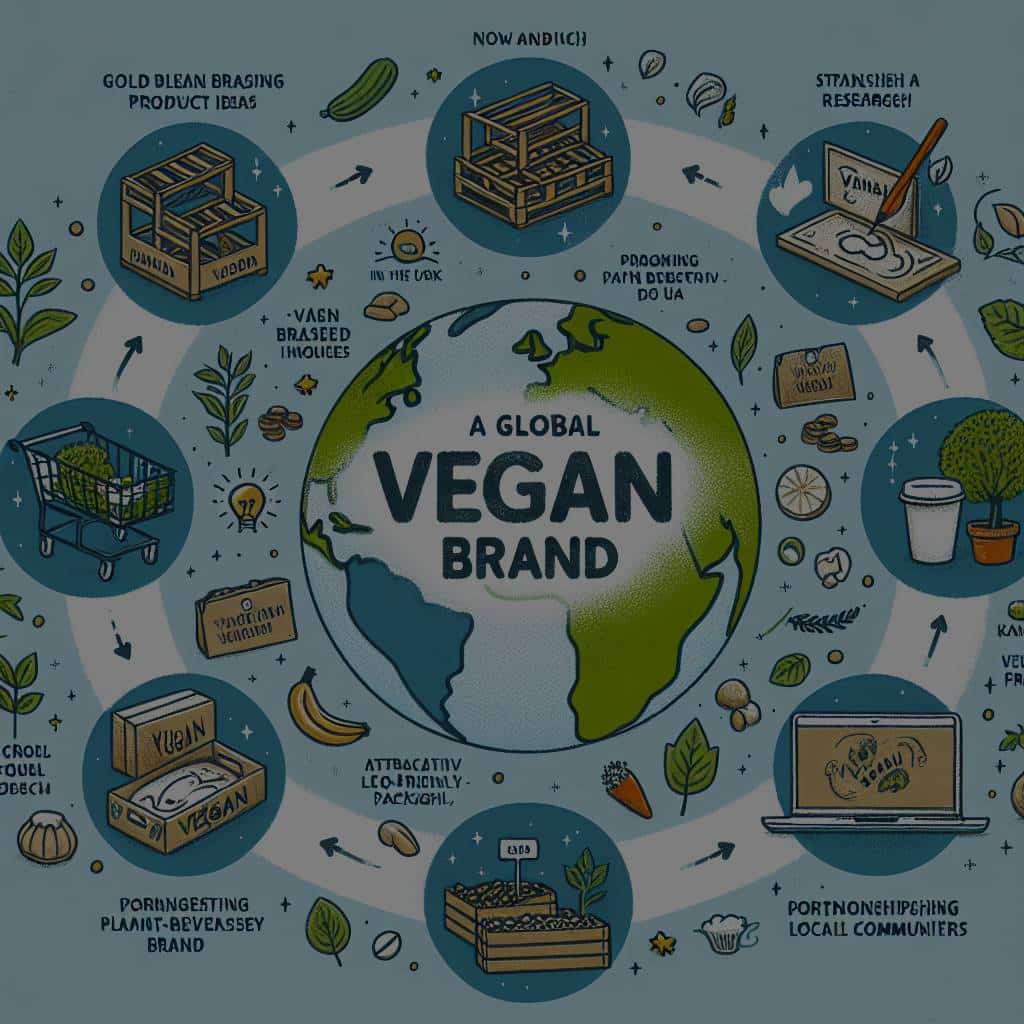Welcome to the future of food, ladies and gentlemen. As we find ourselves in the year 2024, the global growth of the vegan market is an undeniable phenomenon. With an increasing number of people turning to plant-based diets, the demand for vegan products is skyrocketing. The potential for new brands and companies to thrive in this market is massive. This article will guide you on how to build a UK-based global brand in the vegan market.
Understanding the Vegan Market
Before diving into the specifics of building a brand, it’s important to understand the intricacies of the vegan market. This sector is characterised by immense growth, primarily driven by the increasing number of people adopting veganism to live healthier lives, protect animals, and reduce their carbon footprint. The market is teeming with opportunities for innovative products, from plant-based meat substitutes to dairy-free alternatives.
Also read : How Can UK Businesses Utilize Solar Energy to Cut Costs?
The global vegan food market value was estimated to be worth around $20.8 billion in 2020 and is projected to reach a staggering $31.4 billion by 2026. This growth in value is reflected in the rise of veganism in the UK, with the number of vegans quadrupling between 2014 and 2019. This trend is showing no sign of slowing down, making it the ideal time to launch a vegan brand.
Building Your Brand Identity
The first step in creating a successful vegan brand is developing a clear brand identity. This goes beyond just a catchy name and logo. Your brand identity is essentially your company’s personality. It’s what sets you apart from your competitors and connects with your target consumers.
Also to discover : What Is the Effect of UK Immigration Policies on the Tech Industry Workforce?
For a vegan brand, your identity needs to clearly communicate your commitment to producing high-quality plant-based products. Your brand should align with the values of your target consumer, whether that’s sustainability, animal welfare, or health and wellness.
In addition to this, it’s essential that your product stands out on the shelf. A unique and well-designed packaging can draw consumers in, while clear labelling of your vegan ingredients can assure them of your product’s authenticity.
Developing Your Product
Next, let’s focus on your product. A product is the heart of your brand. It’s what you’re bringing to the market, so it needs to be exceptional.
In the vegan market, your product should be plant-based and cruelty-free. But it shouldn’t just be about what’s not in it; it should also be about what is. Make sure your product is packed with nutritious ingredients that will appeal to health-conscious consumers.
In terms of taste, your product needs to compete not just with other vegan products, but with animal-based foods as well. A vegan product that can match or surpass the flavour and texture of its animal-based counterpart will be highly attractive to not just vegans, but also flexitarians looking to reduce their meat consumption.
Navigating the UK and Global Markets
Now that you have your brand identity and product, it’s time to hit the market. The UK is a budding vegan market with a consumer base that’s eager for innovative, tasty, and ethical vegan products.
To succeed in the UK market, it’s critical to understand the local vegan scene and its trends. It’s also important to build strong relationships with retailers who can get your product onto the shelves and into the hands of consumers.
Once you’ve established your brand in the UK, it’s time to think global. The vegan market is booming worldwide, especially in countries like the US, Germany, and Australia. Expanding globally will require a good understanding of different markets and their unique consumer demands.
Promoting Your Brand
Finally, promotion is key to building a successful brand. Effective promotion creates a buzz around your brand and drives sales.
In the vegan market, many consumers will be interested in the story behind your brand. Utilising social media platforms and blogs to share your journey, your values, and your mission can help you build a loyal customer base.
In addition, partnering with vegan influencers or sponsoring vegan events can not only increase your brand visibility but also boost your credibility within the vegan community. Remember, your promotional strategies should reflect your brand identity and resonate with your target consumers.
In conclusion, break out the soy milk and toast to the burgeoning vegan market. Building a UK-based global brand in such a vibrant industry is a challenge, but one that’s rich with opportunity. With a clear brand identity, an exceptional product, savvy market navigation, and smart promotion, your brand can thrive in the vegan market, not just in the UK, but across the globe.
Mastering Your Supply Chain and Distribution Channel
In the vegan market, building a successful brand isn’t just about creating a great product—it’s also about making sure that product can reach the shelves—and your customers—efficiently and effectively. This is where mastering your supply chain and distribution channel comes into play.
The supply chain for plant-based products can be complex, involving various stages from the sourcing of raw materials to manufacturing and packaging. Ethical sourcing is a key factor to consider. Consumers are increasingly aware of the environmental implications of their food choices and are likely to support brands that source ingredients sustainably.
Moreover, vegan food products often have different storage and transportation requirements than animal-based products. For instance, many plant-based meat alternatives need to be kept frozen or chilled to maintain their quality. Hence, a robust and efficient cold chain logistics system can be crucial.
Another vital aspect is choosing the right distribution channel. Whether you opt for traditional retail, online stores, or direct-to-consumer models, it’s crucial to understand the advantages and drawbacks of each option. The choice of distribution channel can be guided by market segmentation. For instance, younger, tech-savvy consumers may be more likely to shop for vegan products online, while older consumers may prefer to buy from brick-and-mortar stores.
Lastly, breaking into international markets may require setting up local supply chains and distribution networks, especially in diverse regions like Asia Pacific and South America. Understanding the local regulations and customs, and partnering with local distributors can facilitate this process.
Forecasting Trends and Innovations in the Vegan Market
Staying ahead in the vegan market requires not only understanding the current state of affairs but also forecasting future trends and innovations. As consumer demand for plant-based foods continues to grow, so too does the pace of innovation in the industry.
To start with, alternative meat and dairy products are continually evolving, with novel ingredients and production techniques. For instance, lab-grown meat, algae-based products, and fermented proteins are some emerging trends. Keeping a close eye on these developments can help your brand remain up-to-date and competitive.
Similarly, market segmentation in the vegan food market is becoming increasingly sophisticated. Consumers no longer see veganism as a one-size-fits-all concept, but rather as a spectrum ranging from strict vegans to flexitarians to health-conscious omnivores. This evolving consumer perception opens up opportunities for segmentation product development tailored to different dietary preferences and lifestyle choices.
Furthermore, the drive for sustainability is leading to innovations in eco-friendly packaging and waste reduction. Embracing these trends can enhance your brand’s reputation and appeal to environmentally conscious consumers.
Finally, digital technologies and data analytics are transforming the food industry, from supply chain management to consumer engagement. Leveraging these tools can help your brand enhance efficiency, personalise marketing strategies, and better understand and respond to consumer needs.
In Conclusion
The path to building a successful UK-based global brand in the vegan market is indeed a challenging one, but one that is filled with immense opportunities. By understanding the vegan market dynamics, building a strong brand identity, developing an exceptional product, mastering your supply chain and distribution channel, staying ahead of trends and innovations, and promoting your brand effectively, you can make your mark in this rapidly growing field. Remember that it’s not just about offering plant-based alternatives to meat products, it’s about providing a product that resonates with the values and lifestyle choices of your consumers. So, join the plant-based revolution and make a difference in the world of food and drink.











